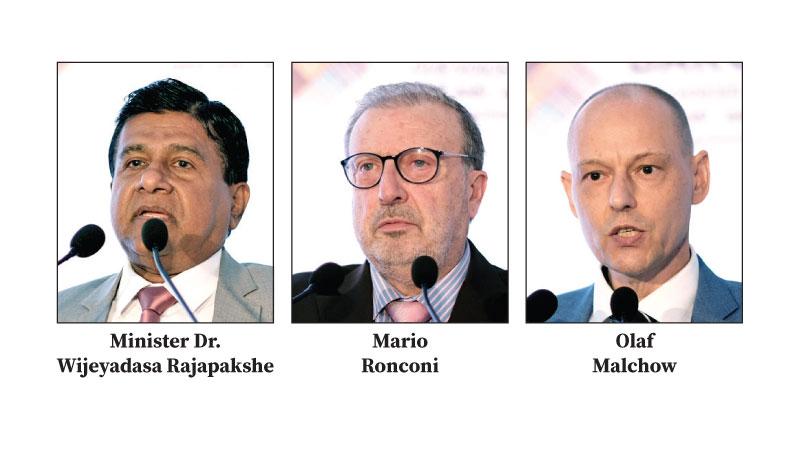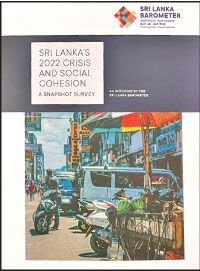
The Sri Lanka Barometer (SLB) unveiled two national reports in Colombo on May 8, presenting public opinion survey data that sheds light on how Sri Lankans across all provinces perceive reconciliation and social cohesion. The event, titled ‘Understanding Social Change - Survey Data and Public Opinion in Sri Lanka,’ featured the official presentation of the SLB Public Opinion Survey 2021 and the SLB Snapshot Survey 2022, and was attended by esteemed guests, including the Minister of Justice, Dr. Wijeyadasa Rajapakshe.
The SLB, supported by the programme Strengthening Social Cohesion and Peace in Sri Lanka (SCOPE), is a joint effort co-financed by the European Union and the German Federal Foreign Office. Implementation is carried out by Deutsche Gesellschaft für Internationale Zusammenarbeit (GIZ) GmbH in partnership with the Ministry of Justice, Prison Affairs, and Constitutional Reforms. The initiative aims to deepen the understanding of reconciliation and its various dimensions among Sri Lankans.
A diverse audience consisting of policymakers, researchers, university representatives, media practitioners, clergy, and civil society members graced the inauguration ceremony at the Taj Samudra. The Sri Lanka Barometer Consortium, comprising partners such as the Institute for Justice and Reconciliation (IJR) in South Africa, the Centre for Poverty Analysis (CEPA), and SCOPE, hosted the event.
The occasion was graced by international dignitaries, including Mario Ronconi, Head of Unit for South and South East Asia at the Directorate General for International Partnerships of the European Commission; Olaf Malchow, German Deputy Ambassador to Sri Lanka and the Maldives and Sandile Edwin Schalk, South African High Commissioner to Sri Lanka and the Maldives.
The Sri Lanka Barometer consists of three key components: a nationally representative public opinion survey, qualitative research, and outreach events. It was initiated in 2018 at the invitation of the Sri Lankan government and received formal support from the Ministry of Justice. Understanding public opinion on unity, harmony, and social cohesion has been a priority for the Government of Sri Lanka, with public consultations and opinion tracking recommended for effective policymaking.
Minister Wijeyadasa Rajapakshe expressed his satisfaction with the initiative, highlighting its inspiration from South Africa. He praised the cooperation with South Africa, where the Sri Lankan government gained valuable experience in truth and reconciliation initiatives.
Mario Ronconi stressed the importance of the initiative for all stakeholders, emphasizing the European Union’s support and the potential for driving societal progress through enhanced mutual understanding. Reconciliation and social cohesion are top priorities for the European Union’s strategy in Sri Lanka, and the Sri Lanka Barometer serves as an example of Team Europe’s support in strengthening resilience and promoting peaceful societies.
Olaf Malchow, the German Deputy Ambassador to Sri Lanka and the Maldives, expressed his pleasure in Germany’s involvement with the independent and unique Sri Lanka Barometer initiative. He emphasized the potential of reliable data to enhance public discourse and bridge gaps within and between communities.
 Looking ahead, the Sri Lanka Barometer Consortium plans to facilitate the use of quantitative data for key stakeholders in governance, media, and civil society through training sessions conducted by the Institute for Justice and Reconciliation (IJR). The Centre for Poverty Analysis (CEPA) will spearhead a program to encourage young researchers to engage with the data and conduct qualitative research. SCOPE will organise public debates to discuss the SLB findings and their implications for the people of Sri Lanka.
Looking ahead, the Sri Lanka Barometer Consortium plans to facilitate the use of quantitative data for key stakeholders in governance, media, and civil society through training sessions conducted by the Institute for Justice and Reconciliation (IJR). The Centre for Poverty Analysis (CEPA) will spearhead a program to encourage young researchers to engage with the data and conduct qualitative research. SCOPE will organise public debates to discuss the SLB findings and their implications for the people of Sri Lanka.
Independent researcher Natasha Palansuriya presented the key highlights from the SLB Survey 2021 and SLB Snapshot Survey 2022 reports, which were based on a broad definition of reconciliation that is based on Sri Lankans’ understanding and lived experiences. The sample of nearly 4,000 represented accurately the demographic and geographical diversity of the adult population of the country, enabling everyone to extrapolate nationally representative data with disaggregation of shared opinions across and within communities of Sri Lanka.
All the Sri Lanka Barometer resources are publicly available upon request. The event was livestreamed on the @SriLankaBarometer Facebook page.
